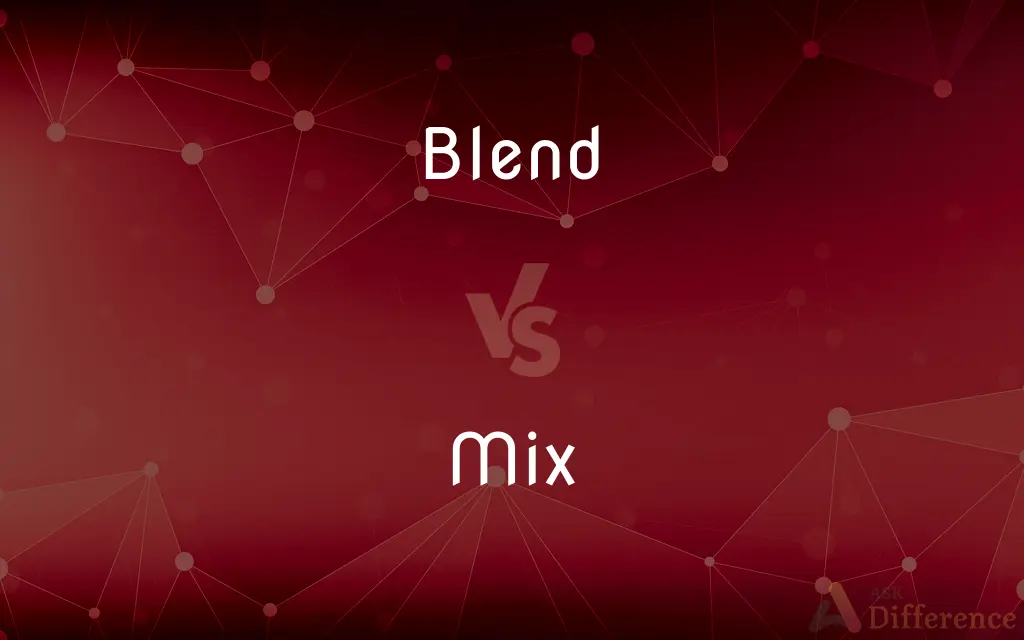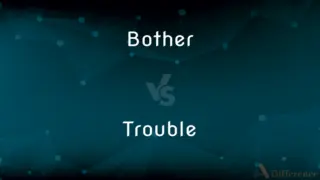Blend vs. Mix — What's the Difference?
By Tayyaba Rehman & Urooj Arif — Updated on March 15, 2024
Blend implies a smooth integration of elements to achieve uniformity, while mix refers to combining elements without necessarily achieving uniformity.

Difference Between Blend and Mix
Table of Contents
ADVERTISEMENT
Key Differences
Blending often aims for a homogeneous result where the individual components become indistinguishable. For example, in cooking, blending ingredients can result in a smoothie or sauce where the original ingredients are no longer visually identifiable. Mixing, on the other hand, involves combining elements where each component may still retain its identity. Mixing is used in contexts where the interaction of distinct parts is desired without completely losing their individual characteristics.
This process of blending is common in food preparation, art, and music, where achieving a seamless integration of different elements is desired. For instance, mixing colors in painting might result in a marbled effect where the original colors are still recognizable.
The choice between blending and mixing can depend on the desired outcome of the process. Blending is chosen to achieve uniformity and consistency, making it ideal for processes that require a smooth and integrated result. In contrast, mixing is preferred when the goal is to combine elements while maintaining some level of distinction among them.
Blending is often used in the context of digital media and technology to merge different elements seamlessly, such as in digital image editing or sound engineering. Here, the aim is to integrate sounds or visual elements so smoothly that the transition between them is imperceptible. Mixing, however, plays a crucial role in industries such as construction and materials science, where components need to be combined to achieve a certain performance without necessarily blending them into a single, indistinguishable entity. This method allows for the creation of materials and solutions that benefit from the unique properties of their individual components.
Comparison Chart
Goal
To achieve a homogeneous result with smooth integration.
To combine elements, allowing for individual identities.
ADVERTISEMENT
Outcome
Components become indistinguishable.
Components retain some individual characteristics.
Process
Often requires a device or technique for fine integration.
Can be achieved by simply stirring or combining elements.
Common Contexts
Food preparation, digital media, sound engineering.
Cooking, painting, construction, materials science.
Example
Blending fruits into a smoothie.
Mixing different nuts and fruits in a salad.
Compare with Definitions
Blend
To harmonize or mesh well together.
Their diverse skills blended well to create a successful project.
Mix
To combine two or more substances so that they still retain their separate properties.
Mix the flour and sugar before adding wet ingredients.
Blend
To mix ingredients or elements together until they are smooth and uniform.
She blended the fruits and yogurt to make a smoothie.
Mix
In construction, to combine materials like cement, sand, and water.
He mixed the concrete for the foundation.
Blend
In digital art, to integrate different layers or colors smoothly.
He used a soft brush to blend the colors in the digital painting.
Mix
In music, to combine various tracks or sounds into one recording.
The engineer mixed the band's tracks for the final album.
Blend
In textiles, to combine different fibers into a single yarn.
The fabric was made by blending cotton and polyester.
Mix
To stir or toss different ingredients together in cooking.
Mix the salad thoroughly to distribute the dressing evenly.
Blend
The process of combining different notes or sounds seamlessly.
The DJ mastered how to blend tracks together flawlessly.
Mix
To bring together different elements in a collection.
The anthology mixed stories from both new and established writers.
Blend
To combine or mix (different substances) so that the constituent parts are indistinguishable from one another
Blended the flour, milk, and eggs.
Blend gasoline with ethanol.
Mix
To combine or blend into one mass or mixture
Mix the dry ingredients first.
Blend
To combine (varieties or grades of the same substance) to obtain a mixture of a particular character, quality, or consistency
Blend coffees.
Mix
To create or form by combining ingredients
Mix a drink.
Mix cement.
Blend
To combine (different elements) into a single entity
A career that blends medicine and engineering.
Mix
To add (an ingredient or element) to another
Mix an egg into batter.
Blend
To form a uniform mixture
“The smoke blended easily into the odor of the other fumes” (Norman Mailer).
Mix
To combine or join
Mix joy with sorrow.
Blend
To be unobtrusive or harmonious by resembling the surroundings or behaving like others in a group. Often used with in
A female pheasant is brown and blends in with its nesting ground.
Mix
To bring into social contact
Mix boys and girls in the classroom.
Blend
To create a harmonious effect or result
Picked a tie that blended with the jacket.
Mix
To produce (an organism) by crossbreeding.
Blend
The act of blending
The writer's unique blend of fantasy and physics.
Mix
To combine (two or more audio tracks or channels) to produce a composite audio recording.
Blend
Something, such as an effect or a product, that is created by blending
“His face shows, as he stares at the fire, a blend of fastidiousness and intransigence” (John Fowles).
Mix
To produce (a soundtrack or recording) in this manner.
Blend
(Linguistics) A word produced by combining parts of other words, as smog from smoke and fog.
Mix
To become combined or blended together
Stir until the eggs mix with the flour.
Blend
A mixture of two or more things.
Their music has been described as a blend of jazz and heavy metal.
Our department has a good blend of experienced workers and young promise.
Mix
To be capable of being blended together
Oil does not mix with water.
Blend
(linguistics) A word formed by combining two other words; a grammatical contamination, portmanteau word.
Mix
To associate socially or get along with others
He does not mix well at parties.
Blend
(transitive) To mingle; to mix; to unite intimately; to pass or shade insensibly into each other.
To make hummus you need to blend chickpeas, olive oil, lemon juice and garlic.
Mix
To mate so as to produce a hybrid; crossbreed.
Blend
(intransitive) To be mingled or mixed.
Mix
To become involved
In the case of a family argument, a friend should not mix in.
Blend
(obsolete) To pollute by mixture or association; to spoil or corrupt; to blot; to stain.
Mix
A combination of diverse elements
The downtown has a good mix of stores and restaurants.
Blend
To mix or mingle together; esp. to mingle, combine, or associate so that the separate things mixed, or the line of demarcation, can not be distinguished. Hence: To confuse; to confound.
Blending the grand, the beautiful, the gay.
Mix
A mixture of ingredients packaged and sold commercially
A cake mix.
Blend
To pollute by mixture or association; to spoil or corrupt; to blot; to stain.
Mix
A recording that is produced by combining and adjusting two or more audio tracks or channels.
Blend
To mingle; to mix; to unite intimately; to pass or shade insensibly into each other, as colors.
There is a tone of solemn and sacred feeling that blends with our conviviality.
Mix
An animal resulting from interbreeding, especially a dog or cat of mixed breed.
Blend
To make blind, literally or figuratively; to dazzle; to deceive.
Mix
(transitive) To stir together.
Mix the eggs and milk with the flour until the consistency is smooth.
Blend
A thorough mixture of one thing with another, as color, tint, etc., into another, so that it cannot be known where one ends or the other begins.
Mix
(transitive) To combine (items from two or more sources normally kept separate).
To mix business with pleasure
Don't mix the meat recipes with the dairy recipes.
Blend
An occurrence of thorough mixing
Mix
(ambitransitive) To form by mingling; to produce by the stirring together of ingredients; to concoct from different parts.
Yellow and blue paint mix to make green.
Blend
A new word formed by joining two others and combining their meanings;
`smog' is a blend of `smoke' and `fog'
`motel' is a portmanteau word made by combining `motor' and `hotel'
`brunch' is a well-known portmanteau
Mix
(transitive) To blend by the use of a mixer machine.
Mix the egg whites until they are stiff.
Blend
The act of blending components together thoroughly
Mix
To combine (several tracks).
I'll mix the rhythm tracks down to a single track.
Blend
Combine into one;
Blend the nuts and raisins together
He blends in with the crowd
We don't intermingle much
Mix
To produce a finished version of (a recording).
I'm almost done mixing this song.
Blend
Blend or harmonize;
This flavor will blend with those in your dish
This sofa won't go with the chairs
Mix
(ambitransitive) To unite with in company; to join; to associate.
Blend
Mix together different elements;
The colors blend well
Mix
The result of mixing two or more substances; a mixture.
Now add the raisins to the mix.
Mix
The result of combining items normally kept separate.
My recipe file was now a mix of meat and dairy.
The combination of classical music and hip hop is a surprisingly good mix.
Mix
(music) The result of mixing several tracks.
The rhythm mix sounds muddy.
Mix
(music) The finished version of a recording.
I've almost finished the mix for this song.
Mix
To cause a promiscuous interpenetration of the parts of, as of two or more substances with each other, or of one substance with others; to unite or blend into one mass or compound, as by stirring together; to mingle; to blend; as, to mix flour and salt; to mix wines.
Fair persuasions mixed with sugared words.
Mix
To unite with in company; to join; to associate.
Ephraim, he hath mixed himself among the people.
Mix
To form by mingling; to produce by the stirring together of ingredients; to compound of different parts.
Hast thou no poison mixed?
I have chosen an argument mixed of religious and civil considerations.
Mix
To combine (two or more activities) within a specified or implied time frame; as, to mix studying and partying while at college.
Mix
To become united into a compound; to be blended promiscuously together.
Mix
To associate; to mingle; as, Democrats and Republicans mixed freely at the party.
He had mixedAgain in fancied safety with his kind.
Mix
A commercially prepared mixture of dry ingredients
Mix
An event that combines things in a mixture;
A gradual mixture of cultures
Mix
The act of mixing together;
Paste made by a mix of flour and water
The mixing of sound channels in the recording studio
Mix
Mix together different elements;
The colors blend well
Mix
Open (a place) to members of all races and ethnic groups;
This school is completely desegregated
Mix
To bring or combine together or with something else;
Resourcefully he mingled music and dance
Mix
As of electronic signals;
Mixing sounds
Mix
Add as an additional element or part;
Mix water into the drink
Mix
Mix so as to make a random order or arrangement;
Shuffle the cards
Common Curiosities
Is a blender used only for blending, not mixing?
Primarily for blending to achieve smooth textures, though it can also mix ingredients to some degree.
Why is mixing important in construction?
Mixing ensures that materials like concrete achieve the right consistency and properties without needing uniformity.
What is the main difference between blending and mixing?
Blending aims for uniformity and smooth integration, while mixing combines elements without necessarily achieving uniformity.
Can you blend without a machine?
Yes, in contexts like art or sound engineering, blending can be achieved manually or through software, not just with kitchen appliances.
Why might an artist choose to mix rather than blend colors?
To retain some original color identity and create visual interest or texture in the artwork.
Is a mixer and a blender the same appliance?
No, they are designed for different purposes; blenders for creating smooth liquids, mixers for combining ingredients, often with varying textures.
In what scenario would blending be preferred over mixing in food preparation?
When making sauces, smoothies, or soups where a smooth, uniform texture is desired.
Can blending and mixing be used interchangeably in cooking?
They can be used based on the desired texture; blending for smooth results, mixing for combining ingredients while retaining texture.
How do blend and mix differ in music production?
Blending involves seamless integration of sounds, whereas mixing adjusts and combines tracks, maintaining their distinct qualities.
How does the concept of mix apply in social contexts?
It refers to bringing together diverse groups or elements, allowing for interaction while maintaining distinct identities.
Does mixing always result in a heterogeneous mixture?
Often, but not always; the extent can vary depending on the method and intent.
Is blending more time-consuming than mixing?
It can be, especially if a very smooth and uniform result is required, necessitating fine processing.
Can the terms blend and mix be used metaphorically?
Yes, both can describe the integration of ideas, cultures, or styles, with nuances depending on the context.
How does blending affect the taste of food compared to mixing?
Blending can intensify flavors by combining ingredients thoroughly, whereas mixing may allow for distinct tastes of components.
What role does texture play in deciding whether to blend or mix?
Texture is key; blending is chosen for smooth textures, while mixing is preferred when texture variation is desired.
Share Your Discovery

Previous Comparison
Bother vs. Trouble
Next Comparison
Theist vs. DeistAuthor Spotlight
Written by
Tayyaba RehmanTayyaba Rehman is a distinguished writer, currently serving as a primary contributor to askdifference.com. As a researcher in semantics and etymology, Tayyaba's passion for the complexity of languages and their distinctions has found a perfect home on the platform. Tayyaba delves into the intricacies of language, distinguishing between commonly confused words and phrases, thereby providing clarity for readers worldwide.
Co-written by
Urooj ArifUrooj is a skilled content writer at Ask Difference, known for her exceptional ability to simplify complex topics into engaging and informative content. With a passion for research and a flair for clear, concise writing, she consistently delivers articles that resonate with our diverse audience.














































